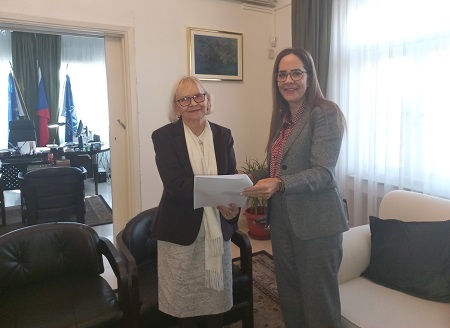
H.E. PhDr. Eva Filipi, Ambassador Extraordinary, and Plenipotentiary of the Czech Republic to the Syrian Arab Republic and Dr Iman Shankiti, a.i WHO Representative in Syria 16 January 2022 – The Government of the Czech Republic has contributed a generous donation of US$ 150 000 to boost WHO’s efforts in combating the cholera outbreak in Syria.
Eleven years into the conflict, damage to the water and sanitation infrastructure in Syria have left much of the population dependent upon unsafe water for their daily use, placing them at greater risk of cholera infection and waterborne and foodborne diseases. Health care facilities also face unsafe water supplies and poor sanitation infrastructure, placing patients and health care workers at risk.
“Safe water, sanitation and hygiene (WASH) are crucial to human health and well-being. Adequate WASH services are not only a prerequisite to health but also contribute to livelihoods and help create resilient communities living in healthy environments,” said Dr Iman Shankiti, WHO Representative a.i. in Syria.
“WHO extends its appreciation to the Government of the Czech Republic for its kind contribution which comes at a crucial time, as multiple efforts join hands to prevent the spread of cholera and alleviate the suffering of the Syrian people,” Dr Shankiti added.
WHO has been working to align and strengthen the collaborative efforts of stakeholders within multisectoral coordination platforms to ensure adequate support for all aspects of WASH in health facilities. With the Czech Republic’s kind donation and in cooperation with the Ministry of Health and WASH sector partners, WHO aims to prevent the further spread of the disease by enhancing infection, prevention, and control measures within specific health care facilities in Deir-ez-Zor governorate through the rehabilitation of WASH facilities; ensuring the provision of safe drinking-water; improving drinking-water surveillance programms by providing water testing equipment and reagents, as well as conducting field-level hands-on training for equipment operations; and strengthening the capacity of central and government laboratories to conduct the necessary tests for food contamination.
Despite the prevailing challenges, WHO continues to support the WASH sector by collecting drinking-water samples and conducting testing for bacterial contamination across Syria. WHO has also provided support to establish safe water supplies in cholera treatment centres and has conducted infection prevention and control activities, playing a crucial role in minimizing the possibility of cholera transmission within health facilities.








